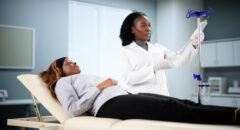
You may have heard about the tell-tale signs of a stroke – slurred speech, loss of balance, trouble speaking, and more – but did you know you can have a stroke without knowing it? This condition is called a silent stroke and can cause the same damage to your brain as the other types of strokes you’ve heard of. That’s why it’s crucial to get diagnosed and treated as soon as possible.
What Is a Stroke?
A stroke is a medical emergency that occurs when blood flow to a part of the brain is interrupted, causing brain cells to die from a lack of oxygen. This happens either when a blood vessel is blocked (ischemic stroke) or when a blood vessel in or around the brain bursts (hemorrhagic stroke). Strokes can cause permanent brain damage, leading to disability or death, so immediate medical help is crucial.
Types of Stroke
- Ischemic stroke: The most common type, caused by a blood clot that blocks a brain artery.
- Hemorrhagic stroke: Occurs when a blood vessel in or near the brain ruptures and bleeds.
- Transient ischemic attack (TIA): Also known as a “mini-stroke,” where a blood clot temporarily blocks an artery. Symptoms are the same as a stroke but are short-lived, though a TIA can be a warning sign of a future stroke.
How a ‘Silent’ Stroke Works
When a silent stroke occurs, a blood vessel in the brain becomes blocked, preventing oxygen from reaching brain cells.
Unlike a major stroke, there are no obvious warning signs like a drooping face or slurred speech.
The brain damage may be too small for the person to notice, or surrounding brain areas may compensate for the damage.
Silent strokes are often only discovered during brain imaging, such as an MRI or CT scan, performed for other reasons.
5 Signs You’ve Had A Silent Stroke And Did Not Know It
1. Your Mood Or Personality Changes
These changes can range from being obvious to slight. You might notice that you’ve become more irritable than before, or you get sad at the drop of a hat. In either case, feeling less like yourself could be a sign that you had a silent stroke recently.
2. You’re Having Trouble With Your Memory
This sign goes a little further than forgetting where you’ve put your keys. If you’ve started to slip up on a person’s name, the names of locations, and other things that weren’t an issue before, you should see your doctor. Even if you haven’t had a stroke, it could still be an indication that you’re developing a form of dementia.
3. You’re Falling More Often
Anyone can lose their balance from time to time but if you’re constantly falling, then you might be in trouble. A silent stroke not only affects your balance, but it can also impact your muscles and how you interpret spatial differences.
4. Your Muscles Don’t Work Well Temporarily
When you have a silent stroke, you may experience a temporary change in how your muscles function. This effect can vary from one group of muscles to another. For example, you might have trouble holding your urine because of weakness in your bladder muscles.
5. You Can’t Concentrate
Given that strokes damage the brain, it shouldn’t be surprising that you may have trouble concentrating. While stressful situations can often do that, this change in your cognitive function doesn’t go away. For some people, it worsens over time.
RELATED: 4 Ways to Identifying A Stroke

How The Condition Is Diagnosed
The symptoms of a silent stroke can be so subtle that they’re either ignored or misdiagnosed. Symptoms such as changes in balance and memory are often attributed to aging, especially in older adults.
It’s also important to note that multiple silent strokes have been known to increase your risk of developing dementia, so the conditions can be linked.
The only way to diagnose a silent stroke is through an MRI or CT scan. The resulting image would show damage to the area where the stroke occurred, characterized by the presence of white spots or lesions.
Since a silent stroke usually only affects a specific section of the brain each time, different white spots can indicate that you’ve had multiple strokes.
RELATED: What You Don’t Know About Strokes Could Kill You
What You’ll Need To Do
While the damage from a silent stroke is typically irreversible, there are some ways to manage your symptoms. For example, physiotherapy can be used to improve your balance. If you’re having issues with memory and cognitive function, your doctor may recommend brain-based exercises as well.
It’s important to note that each silent stroke increases your chances of having a more significant stroke. That means you’ll also need to focus on preventing this.
Some of the changes you can make include having a regular exercise routine, reducing your alcohol intake, quitting tobacco, and keeping chronic conditions like diabetes under control. When it comes to your diet, it’s best to reduce your intake of salt and processed foods.
Overall, it’s a good idea to see your doctor regularly for a check-up. They can assess you for the general risks associated with strokes so you know where you stand.
A silent stroke can happen to anyone at any time. Though it’s not always easy to spot the signs, you should be wary of any changes in your health. If you notice the signs that are listed here, see your doctor quickly so you can get some answers.









